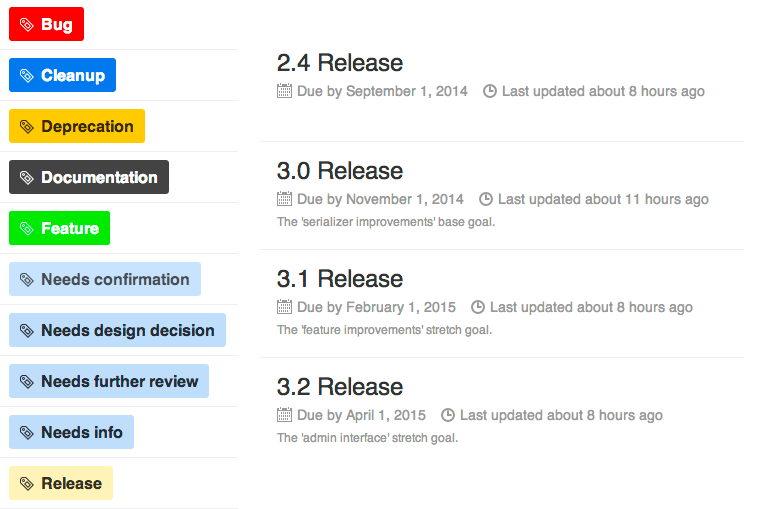7.6 KiB
REST framework 2.4 announcement
The 2.4 release is largely an intermediate step, tying up some outstanding issues prior to the 3.x series.
Version requirements
Support for Django 1.3 has been dropped. The lowest supported version of Django is now 1.4.2.
The current plan is for REST framework to remain in lockstep with Django's long-term support policy.
Django 1.7 support
The optional authtoken application now includes support for both Django 1.7 schema migrations, and for old-style south migrations.
If you are using authtoken, and you want to continue using south, you must upgrade your south package to version 1.0.
Deprecation of .model view attribute
The .model attribute on view classes is an optional shortcut for either or both of .serializer_class and .queryset. Its usage results in more implicit, less obvious behavior.
The documentation has previously stated that usage of the more explicit style is prefered, and we're now taking that one step further and deprecating the usage of the .model shortcut.
Doing so will mean that there are cases of API code where you'll now need to include a serializer class where you previously were just using the .model shortcut. However we firmly believe that it is the right trade-off to make.
Removing the shortcut takes away an unneccessary layer of abstraction, and makes your codebase more explicit without any significant extra complexity. It also results in better consistency, as there's now only one way to set the serializer class and queryset attributes for the view, instead of two.
The DEFAULT_MODEL_SERIALIZER_CLASS API setting is now also deprecated.
Updated test runner
We now have a new test runner for developing against the project,, that uses the excellent py.test library.
To use it make sure you have first installed the test requirements.
pip install -r requirements-test.txt
Then run the runtests.py script.
./runtests.py
The new test runner also includes flake8 code linting, which should help keep our coding style consistent.
Test runner flags
Run using a more concise output style.
./runtests -q
Run the tests using a more concise output style, no coverage, no flake8.
./runtests --fast
Don't run the flake8 code linting.
./runtests --nolint
Only run the flake8 code linting, don't run the tests.
./runtests --lintonly
Run the tests for a given test case.
./runtests MyTestCase
Run the tests for a given test method.
./runtests MyTestCase.test_this_method
Shorter form to run the tests for a given test method.
./runtests test_this_method
Note: The test case and test method matching is fuzzy and will sometimes run other tests that contain a partial string match to the given command line input.
Improved viewset routing
The @action and @link decorators were inflexible in that they only allowed additional routes to be added against instance style URLs, not against list style URLs.
The @action and @link decorators have now been moved to pending deprecation, and the @list_route and @detail_route decorators have been introduced.
Here's an example of using the new decorators. Firstly we have a detail-type route named "set_password" that acts on a single instance, and takes a pk argument in the URL. Secondly we have a list-type route named "recent_users" that acts on a queryset, and does not take any arguments in the URL.
class UserViewSet(viewsets.ModelViewSet):
"""
A viewset that provides the standard actions
"""
queryset = User.objects.all()
serializer_class = UserSerializer
@detail_route(methods=['post'])
def set_password(self, request, pk=None):
user = self.get_object()
serializer = PasswordSerializer(data=request.DATA)
if serializer.is_valid():
user.set_password(serializer.data['password'])
user.save()
return Response({'status': 'password set'})
else:
return Response(serializer.errors,
status=status.HTTP_400_BAD_REQUEST)
@list_route()
def recent_users(self, request):
recent_users = User.objects.all().order('-last_login')
page = self.paginate_queryset(recent_users)
serializer = self.get_pagination_serializer(page)
return Response(serializer.data)
For more details, see the viewsets documentation.
Throttle behavior
There's one bugfix in 2.4 that's worth calling out, as it will invalidate existing throttle caches when you upgrade.
We've now fixed a typo on the cache_format attribute. Previously this was named "throtte_%(scope)s_%(ident)s", it is now "throttle_%(scope)s_%(ident)s".
If you're concerned about the invalidation you have two options.
- Manually pre-populate your cache with the fixed version.
- Set the
cache_formatattribute on your throttle class in order to retain the previous incorrect spelling.
Other features
There are also a number of other features and bugfixes as listed in the release notes. In particular these include:
Customizable view name and description functions for use with the browsable API, by using the VIEW_NAME_FUNCTION and VIEW_DESCRIPTION_FUNCTION settings.
Smarter client IP identification for throttling, with the addition of the NUM_PROXIES setting.
Added the standardized Retry-After header to throttled responses, as per RFC 6585. This should now be used in preference to the custom X-Throttle-Wait-Seconds header which will be fully deprecated in 3.0.
Deprecations
All API changes in 2.3 that previously raised PendingDeprecationWarning will now raise a DeprecationWarning, which is loud by default.
All API changes in 2.3 that previously raised DeprecationWarning have now been removed entirely.
Furter details on these deprecations is available in the 2.3 announcement.
Labels and milestones
Although not strictly part of the 2.4 release it's also worth noting here that we've been working hard towards improving our triage process.
The labels that we use in GitHub have been cleaned up, and all existing tickets triaged. Any given ticket should have one and only one label, indicating its current state.
We've also started using milestones in order to track tickets against particular releases.
Above: Overview of our current use of labels and milestones in GitHub.
We hope both of these changes will help make the management process more clear and obvious and help keep tickets well-organised and relevant.
Next steps
The next planned release will be 3.0, featuring an improved and simplified serializer implementation.
Once again, many thanks to all the generous backers and sponsors who've helped make this possible!
